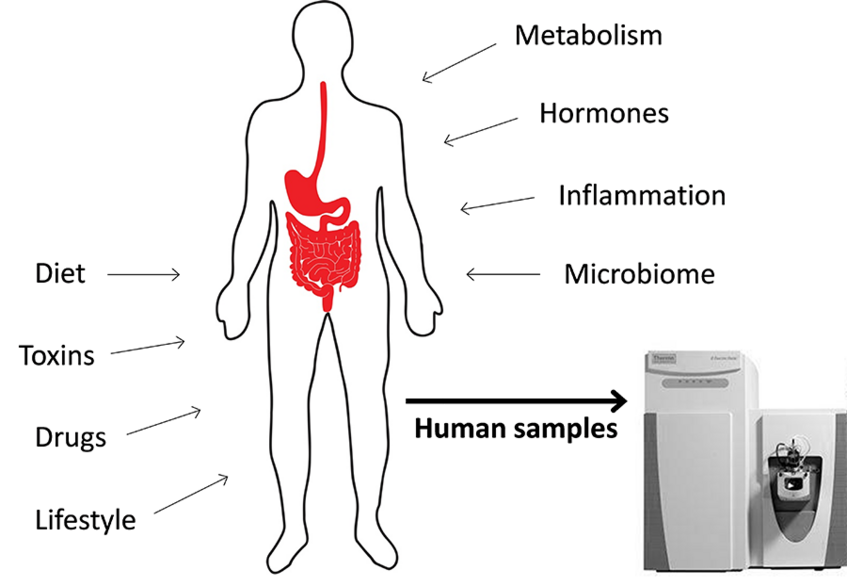Research
The main interest of our group is to unravel the impact of toxicants, contaminants and other xenobiotics on human metabolism and health from a global perspective. This includes food and environmental molecules that can cause adverse effects but also food constituents with protective properties as well as their complex interactions at various levels. Our activities can be attributed to three topics:
Global exposomics & drug-exposome interactions

The holistic and untargeted assessment of xenobiotic exposure in human bio-fluids is currently entering center stage in the field of exposure science and public health research. The concept of the ‘Exposome’ aims towards the holistic investigation of lifetime exposures and their biological/toxicological consequences. We work on establishing new exposomics technology based on high-resolution mass spectrometry (HR-MS) metabolomics workflows to allow for global exposure assessment. Thereby we generate new hypothesis regarding environmental causes of disease and deciphering combinatory toxic effects and drug-exposome interactions.
Key publications:
Pristner M., Warth B. (2020), Drug-Exposome Interactions: The Next Frontier in Precision Medicine, Trends in Pharmacological Sciences, 41, 994-1005
Oesterle I., Braun D., ... Warth B. (2021), Polyphenol Exposure, Metabolism, and Analysis: A Global Exposomics Perspective, Annual Review of Food Science and Technology, 12, 461-484
Guijas C., Montenegro-Burke J.R., Warth B., Spiler M.E., Siuzdak G. (2018), Metabolomics activity screening for identifying metabolites that modulate phenotype, Nature Biotechnology, 30, 316-320
Warth B., Raffeiner P., ... Siuzdak G. (2018), Metabolomics Reveals that Dietary Xenoestrogens Alter Cellular Metabolism Induced by Palbociclib/Letrozole Combination Cancer Therapy, Cell Chemical Biology, 25, 291-300
Warth B., Spangler S., ... Siuzdak G. (2017) Exposome-Scale Investigations Guided by Global Metabolomics, Pathway Analysis, and Cognitive Computing, Analytical Chemistry, 89, 11505-11513
Next-generation human biomonitoring (HBM)
To facilitate individual exposure assessment of environmental and food toxins/contaminants we develop, optimize, and validate advanced LC-MS/MS methods for the accurate quantification of co-exposure. This includes various classes of natural and synthetic contaminant classes that can be measured as biomarkers of exposure and effect in bio-samples such as plasma, serum, urine, placenta, and breast milk. This aims towards the in-depth investigation of the health implications of well-known and emerging contaminants.
Key publications:
Braun D., Schernhammer E., Marko D., Warth B. (2020), Longitudinal Assessment of Mycotoxin Co-Exposures in Exclusively Breastfed Infants, Environment International, 142, 105845
Preindl K., Braun D., ... Warth B. (2019), A Generic Liquid Chromatography-Tandem Mass Spectrometry Exposome Method for the Determination of Xenoestrogens in Biological Matrice, Analytical Chemistry, 91, 11334-11342
Warth B. , Preindl K., ... Buerki-Thurnherr T. (2019), Transfer and Metabolism of the Xenoestrogen Zearalenone in Human Perfused Placenta, Environmental Health Perspectives, 127, 107004
Braun D., Ezekiel C.N., ... Warth B. (2018), Monitoring early-life mycotoxin exposures via LC-MS/MS breast milk analysis, Analytical Chemistry, 90, 14569-14577
Šarkanj B., Ezekiel C.N., ... Warth B. (2018), Ultra-sensitive, stable isotope assisted quantification of multiple urinary mycotoxin exposure biomarkers, Analytica Chimica Acta, 1019, 84-92
Metabolism and multi-toxin analytics of food contaminants
A further core competence of our lab is to investigate the occurrence and metabolism of food contaminants by applying mass spectrometric methods. This is typically done by analysis of food samples, cell extracts from in vitro cell culture experiments, or tissues and bio-fluids obtained from animal experiments.
Key publications:
Flasch M., Bueschl Ch., ... Marko D., Warth B. (2020), Stable isotope-assisted metabolomics for deciphering xenobiotic metabolism in mammalian cell culture, ACS Chemical Biology, 15, 970-981
Braun D., Eiser M., Puntscher H., Marko D., Warth B. (2021), Natural Contaminants in Infant Food: The Case of Regulated and Emerging Mycotoxins, Food Control, 123, 107676
Puntscher H., Aichinger G., ... Marko D., Warth B. (2019), Bioavailability, metabolism, and excretion of a complex Alternaria culture extract versus altertoxin II: a comparative study in rats, Archives of Toxicology, 93, 3153-3167
Puntscher H., Kütt M-L., ... Warth B. (2018), Tracking emerging mycotoxins in food: development of an LC-MS/MS method for free and modified Alternaria toxins, Analytical and Bioanalytical Chemistry, 410, 4481-4494
